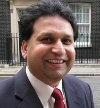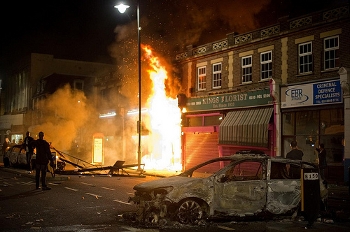 Now that the riots up and down the country have all but fizzled out what should happen next? The Lincoln School of Journalism’s Barnie Choudhury reported for the BBC on the Northern Riots in 2001. In this personal blog, Barnie gives his thoughts.
Now that the riots up and down the country have all but fizzled out what should happen next? The Lincoln School of Journalism’s Barnie Choudhury reported for the BBC on the Northern Riots in 2001. In this personal blog, Barnie gives his thoughts.
Flames engulfing the vehicles and the roar of violence lights up the summer darkness. A petrol bomb misses me by inches. Here we go again. On one side masked youths, on the other police in riot gear. “Hold the line, hold the line,” shouts one officer. It’s midnight on the 7th of July 2001 and even though I’ve been tracking the events for three months across Oldham, Burnley and Bradford I’m still wondering why this has happened. The only thing which will dampen the tensions is rain. I pray for it. It never comes and three nights later the tension is spent and it all fizzles out. Time to reflect.
Fast forward to the 8th August 2011 and I’m with my family at Corfu airport and the British newspapers scream out the headlines. Out of pocket by two and a half Euros, I’m greedily soaking up the news. My stomach knots and I can smell the petrol and burning rubber once again. And I predict what’s going to happen.

Today I can see the similarities and differences. In 2001 text messages mobilised the crowds to the same effect. Youths who had nothing to do with the towns and cities have driven in to grab a bit of the action. A decade later and Twitter, Facebook and Blackberry are the weapons of mass communication acting as a call to arms as well as a clarion for peace. In 2001 we faced calls for water cannons, use of plastic bullets and the army on the streets of mainland Britain. Ten years on and the same calls are being made. Listening to the radio talk-shows and speaking to ordinary folk, like those fitting in our windows, there remains an appetite for all of the above. I just thank God we haven’t crossed that Rubicon. Am I out of touch and just too liberal? I like to think I am neither, but it requires a period of self-reflection. Like someone who abuses his or her partner, it becomes easier the second time until violence becomes routine.
In my view our call for punishment can be met without matching the mindless aggression. In 2001 there was looting but not on this scale. The most impressive difference has been a speedy criminal justice system working through the night to expedite retribution, a rare sight. The move is backed up by a viscerally angry Prime Minister who spits out the sound bites with machine gun precision, promising to run out lawless street gangs, no more political correctness and no more hugging a hoody. To paraphrase: “If you’re old enough to do the crime then expect to do the time. We will take back our streets”. And he’s backed by the biggest gangs of all; the police and the army.
When I was interviewed on Siren FM, Lincoln’s first community radio station, I was asked by its teenage presenters whether I thought this would affect the Olympics. I replied that I was optimistic. In this country, we have this apparent endless energy to bounce back in times of national strife. In this time of tension and trouble the images for me are the man who was apparently being robbed by thugs pretending to help him and the father of one of the South Asian men murdered in Birmingham, standing on the shoulders of his neighbours calling for peace and tolerance, regardless of race, colour or creed.
But that doesn’t mean we shouldn’t learn lessons. Once the dust has settled I hope the government will conduct an enquiry. I know, I know. We’re in danger of being “enquired out”. In 2001 there were three separate reports examining what went wrong. I said at the time and maintain today they missed one crucial element: criminality. Ironically it was Lord Ouseley who got it right, in my view in his report for Bradford City Council on research undertaken before the riots. He concluded that we were living in a culture of fear:
Fear of people talking openly and honestly about problems, either within their communities or across different cultural communities, because of possible repercussions, recriminations and victimisation. Fear of leading and managing effective change because of possible public and media criticism. Fear of challenging wrong-doing because of being labelled “racist” – and that applies across all ethnic
groups. Fear of crime even though the police say that violent crimes are on the decline. Fear of confronting the gang culture, the illegal drugs trade and the growing racial intolerance, harassment and abuse that exists. Fear of confronting all white and/or all Muslim schools about their contribution, or rather lack of contribution, to social and racial integration. Fear of establishing a corporate identity for the District as a whole as most people outside the City and immediate surrounds do not see themselves as part of Bradford.
Once the dust has settled we need one enquiry under one chairman or woman with all-party support. In my view it needs to look at three elements:
- trust between police and communities
- use of social media as a tool for stirring hatred/criminality
- reporting of violence and extremist groups by the media
I hope it won’t be conducted by the usual suspects. I hope there will be fresh blood in there. I hope the subsequent report will have credibility. To do this no subject can be taboo. We have to blast the walls of political correctness and dig until we see what crawls out. In 2001 the problem was based on the fault-lines of race. As Dr Marian Fitzgerald, professor of criminology at Kent Crime and Justice Centre, University of Kent, explained so eloquently on BBC Radio Five Live (from 1:44) this morning, in 2011 these tectonic plates have shifted. Race has played a part in these riots. But not the way we might think. It’s more subtle. It’s more complex. It’s no longer a case of ebony and ivory. It’s about the on-going struggle of accepting new emerging immigrant communities settling in the UK from across Europe. It’s about the identities which make up Britain today. It’s about a breakdown in values. It’s about the hopelessness of youth. It’s about getting something for nothing. It’s so much more than the violent episodes and the looting we’ve witnessed over the past four days.
That old cliché “hindsight is such a wonderful thing” has never been more true. It is a wonderful tool because it just might prevent future trouble – which will happen just as night follows day – but only if we’re humble enough to learn the lessons of history.
Please read our comments policy before posting.




